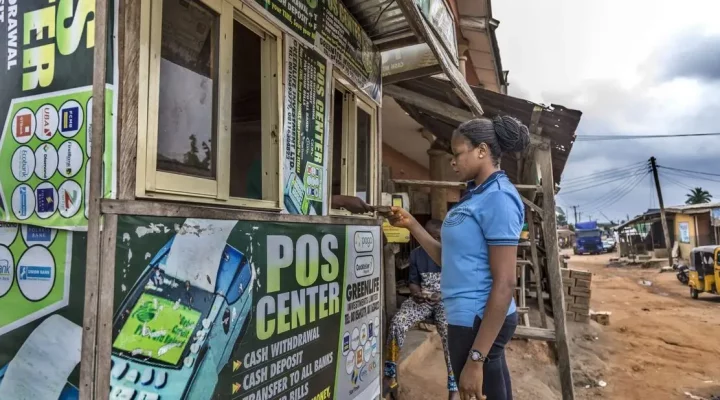PoS: Anger, frustration over high cost of cash withdrawals

Nigerians have voiced anger over outrageous charges Point of Sale, PoS, operators take to withdraw money from their bank accounts.
Citizens who spoke to Vanguard weekend expressed concern that PoS operators are gradually taking over the Automatic Teller Machine, ATM, services from banks across the country.
Many resorted to PoS operators when they found after many stopovers at their banks for self-service that the ATMs were usually empty but cash was available with PoS operators.
On their part, PoS operators narrated huge risks and measures they undertake to get cash, including paying bank officials, saying the charges must be adequate to enable them remain in business
However, effrorts to get bank officials to react to the allegations against them by POS operators proved abortive.
Akwa-Ibom residents cry out
Residents who spoke to Vanguard in Akwa-Ibom State expressed fears over the fraudulent activities of some PoS operators.
A teacher at a private secondary school in Uyo, Mr. Udoh, lamented: “At the ATMs, sometimes there is no money to withdraw. At the PoS, you withdraw N5,000 with N150, sometimes N200; they bill you N300 for N10,000. Two weeks ago, I went to withdraw N20,000 at a PoS at the University of Uyo, and I was charged N800. It is a worrying issue.
“I will advise government to introduce a policy stopping all banks from working hand-in-hand with PoS operators; it will help regulate the amount the PoS operators charge because many people will now like to go to the ATM where they will be charged less.”
A lecturer at UNIUYO explained that he prefers to patronize a PoS close to his residence because of difficulties experienced in using the ATMs of his banks.
He, however, expressed concern over issues involving charges, fraud, and sometimes the exchange of people’s ATM cards’ details, especially by roadside PoS operators.
“Apart from fraudulent activities and network issues common with roadside PoS operators, standard PoS outlets like the one I use will not defraud you or exchange your ATM card details. I have a sister who had an ugly experience recently. When they exchanged her ATM card details, she started seeing alerts for withdrawals she did not make later in the night. And that was how she lost all the money in her account. In just one hour, N400,000 was gone.”
A public servant, Mr. Ekere, said: “I do not use PoS for my transactions. If I transfer N10,000 to N50,000 at the ATM, it charges me less than N50, unlike the POS. Those roadside PoS operators copy your details. Most of them are so smart. That is why some people stay in their houses and get debit alerts.
“They withdraw money from their accounts. Sometimes, you see people rush to the banks to complain or shout. Many things happen with PoS operators.
“Unfortunately, when bank customers go to their banks for withdrawal, they tell them there is no money; meanwhile, they give out enough money to PoS operators. I advise government to look into this issue.”
PoS defrauding us in Edo
Many residents of Edo State also complained about the non-availability of cash at ATMs and the charges that come with using PoS.
Mr. Andrew Aduro said: “This PoS became very popular during the failed naira redesign policy, which created scarcity of cash in the banks, and the few available were mostly also given to PoS operators.
“Today, many ATM points hardly have enough cash; this forced us to resort to PoS operators, and they milk us. I went to a high-profile hotel in Benin City and wanted to use the ATM. I was shocked when it said I could not withdraw more than N5,000.
“After visiting several other bank ATM points without cash to withdraw, I was forced to use the PoS. In most parts of Benin, they charge N300 per N10,000, so you can imagine how much they will charge when you withdraw large amounts.
“I suspect connivance between bankers and PoS operators. I learned some bankers own PoS outlets, so they divert cash to these points.
Advantage of PoS
“However, PoS plurality has an advantage; traveling with cash has been largely reduced. I travel with as little cash as possible because PoS will rescue me. They hardly experience network challenges, unlike the regular ATMs.”
A student at the University of Benin, Bukky, said, “The PoS issue is not fair to us as students. We need money all the time, and at times what we ask is not what our parents or sponsors will send, and from what we get, which is not enough, we still use part of the money to pay for charges for the withdrawals.”
“The banks should regularly load cash into their ATMs on our campuses because the charges there are minimal.”
Provoking experiences in Bayelsa
PoS operators in the predominantly riverine Bayelsa State have gradually become the new ‘bankers’ in town as frustrated customers who cannot get money from banking halls or ATMs patronize them.
Fred Alambo Datonye, a public servant, said, “It is a frustrating experience. Just imagine how you will pay charges to get your own money. You withdraw N5,000 from a PoS operator; you part with N150, and N10,000 is N300.
“Last night, I withdrew N20,000 and paid N500. I do not understand what kind of monetary or financial policy this is. I wonder why Nigerian banks refuse to make cash available to customers. It is nauseating.”
Samuel Ese said: “Since the banks began this unprofessional attitude, I have hardly gone to the banking hall or ATMs. However, on the occasions that I did, it was a mixed experience. Sometimes, there was money, and other times, it was a waste of time, energy, and money.”
Tariyon Akono, a former NUJ chair, Bayelsa State Council, said: “Banks do not have cash in their vaults; they cannot pay as little as N50,000 across the counter anymore. All the cash in the banking system is with PoS operators. Banks give them cash, collect commissions illegally, and then transfer the bill to us.
“They are our new bankers. Why do I want to waste money to pay the transport fare when I can use that money for the fare to pay for the withdrawal charge? The PoS system has employed thousands of ‘bankers.'”
The Collusion in Cross River
In Cross River State, customers accuse banks of colluding with PoS operators.
Pastor Dominic Igri said: “Since January 2023, I have been buying money from PoS operators, and if you calculate the money I have spent on PoS, it is in the range of hundreds of thousands.
“I bought 10,000 with N2,000 during the obnoxious naira exchange hype, and at a point, it went up to N3,000 to get N10,000. The naira redesign policy gave banks the leeway to, I should say, extort money from their customers. After the exchange period, they withdrew cash from ATMs and handed it to PoS operators. This is a sad situation.”
Heart-rending ordeals
Miss Jane Ekpe, a student, said: “Three weeks ago, while writing our first-semester examination, one lecturer fixed his paper for 7.00 am. That early morning, I went to PoS at about 6:30 am to withdraw the N5,000 I had in my account. When I got there, I gave the lady my ATM card and she slotted it and waited for a while before telling me there was no network on the machine.”
“She handed me back the ATM, and as I was about to step out, I saw a debit on my phone. I told the woman, and she said she had not been credited. I went to school hungry, expecting that I would get a reversal. After the exam, there was no reversal, and I walked to the bank.
“I was instructed to get a transaction slip from the PoS woman; when I reached her, she said there was no paper in the machine. The next morning, I went to the bank, and an official told me to return to the woman.
“I went to the lady, and she said there was no record of any transaction on her machine at the time of the transaction since there was no network. That was how I lost my N5,000. Banks are not helping matters by not loading cash in their machines.”
Christian Okon, a politician, told Vanguard: “Recently, we were at the Ranch Resort in Obudu for a retreat. We were there for about five days, and on the final day, a fellow I had not seen at the only ATM stand at the ranch came to handle transactions that morning of our departure. I gave him N5,000 to transfer to my wife that morning since my phone was down.”
“He did and supposedly gave me a transaction slip. Throughout the journey home, I kept asking my wife after I powered my phone, and she said she did not receive the money. The next morning, she went to the bank, and the bank said there was no transaction with that receipt number. I called the fellow, and he insisted that he did transfer the money, and until this moment, there is no trace of that money.”
Adaga Asel, a journalist, said: “In February 2023, I went to the northern part of the state to cover an election. On my way back the next morning, my car engine developed a fault. I managed to get back to Calàbar on public transport. I sent a mechanic there to fix the car, thinking it was just the top.
“He fixed the top and drove the car to a lonely section of the road, and the car stopped. I needed to tow it to Calàbar but had no cash, and the only towing van that agreed insisted on cash. The person who gave me money demanded for N4, 00 for every N10,000.
“I parted with the money; it was not a pleasant experience. The banks make more gains from PoS charges than direct charges on customers’ accounts. This is why they give the PoS people money while their ATMs are empty or load one out of seven machines, causing long queues.
Gnashing of teeth in Delta
In Delta State, Onovughe Fred complained: “Nothing works in our country. It started like a joke, but I was surprised and pained when I paid N4,000 and got N10,000 from a PoS operator. I had to pay because it was the charge during the naira scarcity.”
A furious civil servant in Mosogar, Ethiope-West Local Government Area, Delta State, Mrs. Mary Adebayo, said: “I used to rely on ATMs for quick cash withdrawals, but lately, most of them are either empty or out of service. It is a daily struggle to find a working bank ATM nearby.”
A PoS operator at Olympia in Sapele, Akpime Andrew, said: “Customers come to me because they know I always have cash available. They can withdraw any amount they need, ranging from N5,000 to N100,000, with a small fee. I charge N100 for N1, 000 to N5, 000 and N200 naira for N5, 000 to N10, 000, and so on.”
Mrs. Patience Akporode, who operates a PoS in Jesse community, near Sapele, said, “People prefer to visit me instead of queuing up at the bank. It saves them time and ensures they have cash whenever they desire.”
“However, mine comes with an extra fee; I charge N300 for N10,000, N400 for N20,000, and N4,000 for N100,000 or no dice.”
Banks sell cash to us – Delta POS operator
In the Mosogar community, where they charge N200 for N5,000 and N400 for N10,000, a PoS operator said, “they still sell money to us at the bank; I know what I pay for every N100,000.”
The complaints in Imo, Abia
In Imo State, a resident, one Ibrahim Wale, alleged that 90 percent of PoS operating in Owerri, were established by bankers, a reason that accounts for scarcity of cash at ATMs and availability as PoS stands.
“They (banks) prefer giving the money to their PoS operators. They want to make more profits.”
A trader in front of Imo State Government House, Mrs Terry Uwandu, called on the “Federal Government to set up a monitoring team on the activities of some banks who have refused to load their ATMs with cash because they are frustrating residents and slowing down economic activities.
“Some of the bankers will be the ones to tell you if you do not find money in the ATM, go to the PoS, and collect money. This is wicked. They were the ones that gave the cash to the PoS.”
In Abia State, some residents, who decried the high PoS charges, said they have resigned their fate to God as the Federal Government appears to be an accomplice in the sad development.
One of the residents, Mrs Ihechi said she had since adjusted to the development as she had no option.
“We have adjusted to it because we had no choice. We are helpless. It’s up to the Federal Government through the Central Bank of Nigeria, CBN, to regulate their operations. CBN should introduce some measures to ensure that they don’t exploit the masses or operate at a loss,” she said.
Similarly, another resident, Ibeabuchi Abarikwu, said he dreads going to queue in the banks for transactions, hence he does not bother with POS charges provided they attend to him quickly.
Mixed tunes in Sokoto, Kwara, Borno, Yobe, Nasarawa, Taraba, others
In Sokoto State, there is no serious complaint against PoS charges, which range from N200 to N400 for withdrawing N20,000 to N50,000.
Alhaji Musa Lemu Zaria, a resident of Sokoto metropolis, said PoS operators make him spend less on transport because their charges are much lower than what it takes to transport himself to and from the bank to get cash or make deposits.
However, in Kwara State, PoS operators are angling for the reduction of charges imposed on them by the banks, lamenting that the increment has eaten up their little profits.
“I want to appeal that the new policy should be reviewed to favour the PoS operators and encourage more people to go into the business, and not chasing them out of the business in these hard times,” a female operator said.
In Borno State, PoS charges differ from place to place, and the customers have divergent opinions on the charges.
Mallam Abbas Isyaka, who operates PoS opposite Legacy Garden Housing Estate, near Masha Allah Petrol Filling Station in Maiduguri, charges his customers between N150 and N200 for withdrawing N10,000. He said: “When I started this business in 2023 when the general elections were ongoing, I charged customers N500 per N10,000 transaction, but now that cash is available, I normally charge N150 to N200 per N10,000.
Mood, demand determine PoS charges in Sokoto
Another PoS operator at the popular GSM Market, Maiduguri, Aliyu Isa, said, on a normal working day, he charges his customers N100 per N10,000 but during weekends, he charges N150 to N200 depending on his mood, and demand for cash.
A number of residents interviewed said they are satisfied with charges, claiming that the PoS operators have saved them the hassles of going to queue up at the banking halls for cash transactions.
“The introduction of PoS has saved me from the unnecessary stress we normally experience in the banking hall. Sometimes they charge me N200 for N10,000 transaction, but it is better than N10 charged by direct banking, as it has also saved me from transport cost or fueling my car that will take me to my bank,” said Musa Imam of Polo Ward who resides at the outskirt of Maiduguri Metropolis.
Another Customer, who resides at Gwange ward of Damaturu metropolis, where there is no single bank said: “The system is better compared to the old banking procedure where customers keep shunting in queues and quarreling to get cash.”
However, in Birnin Kebbi, the Kebbi State capital, customers lamented the high cost of services provided by PoS operators.
In Nasarawa State, customers complain about the arbitrary increase in PoS charges and want an intervention to bring down the high cost.
Mustapha Abdullahi, a sachet water vendor in Lafia, the state capital, argued that the purpose of the POS has been defeated by the arbitrary charges of the operators
Other operators, who spoke, echoed the same concerns and asked that the situation be urgently reviewed to save them from being thrown out of business.
In Bauchi State, some PoS operators attributed the rising cost of withdrawing Naira to the high charges being imposed on them by banks. A PoS operator along Bauchi-Dass Road, Manu Ahmed, said: “This is the most difficult time for PoS operators. There are extra charges banks collect from us before we can get cash. When we bring the cash for transactions, people begin to tell us to reduce our charges.
“For instance, if I pay N40 to access N10,000, how much do you think I should charge? You think I can still continue to charge N100 per N10,000? Don’t forget that I will still give the bank its share and will pay for transfer charges and other bank services.
“At the end of the day, you can’t boast of N10 to take home. Is that what I will feed my family with? Now, they are talking about CAC registration. We will still have to source for money to register. This burden is too much,” he said.
However, in Jalingo, the Taraba State capital, PoS customers are happy with the charges. Those who spoke to Vanguard appreciated the affordability of the charges and the convenience the financial inclusion system offers.
A Jalingo resident, Naomi Adi, explained that accessing cash from PoS operators is both fast and convenient.
“A lot of people, including myself, don’t even bother going to banks for withdrawal and cash deposits except when necessary because these PoS agents have bridged that gap. Their charge per N10,000 is just N100, which everyone gladly pays because of the convenience and speed of their services.”
In Minna, Niger State, while the customers are happy with the provision of PoS services, they are however displeased with the high charges.
The charges range from N150 to N200 for N20,000 withdrawal.
Investigation, however, reveals that the PoS operators charge according to how they get their cash.
In Jos, Plateau State, many customers applaud the PoS services but decry the high charges they impose on users.
For this reason, many of the residents of the town said they use PoS sparingly to avoid the high charges. Findings show that many of the PoS operators charge as high as N200 for N10,000.
A customer, Chizoba Chukwu, said, “I don’t have any problem with the charges as long as my aim is achieved for that period. But if I have other alternatives, I won’t use the PoS because their charges are unnecessarily high.
“Some operators charge less when you withdraw a higher amount. For instance, for N50,000 you pay between N200 to N400 as charges depending on who you are dealing with. But some people still charge N500 for N50,000,” a mother told Vanguard.
In Zamfara State many residents said the charges which range from N100 to N500 for N10,000 to N50,000 withdrawal are affordable and acceptable to them compared to the huge amount they would pay for transportation to access their banks.
The feeling of satisfaction with PoS services was also high among residents of Katsina State. They considered PoS a convenient alternative to traditional banks, despite the associated charges due to the speed of transactions and the avoidance of long bank queues
Banks, PoS operators collaboration in Ondo, Ekiti, Ogun, Lagos, others.
In Ondo and Ekiti states, findings showed that bank workers and PoS operators work together to milk Nigerians by always making cash available to PoS operators.
Also, the bank workers inform PoS operators when to visit the ATMs to mop up the cash.
It was gathered that the PoS operators work round the clock, visiting bank ATMs to mop up cash available there before daybreak and thereafter sell at exorbitant prices to the citizens.
A lawyer, Mr. Dele Adekanmbi said: ” We are in a deep mess in this country. We’re the enemies of ourselves. Can you imagine that bank workers have PoS operators working for them across Akure metropolis? What they do is to put calls across to their operators to visit their banks ATM machines already loaded with money. That is why you see people withdrawing money from ATMs at odd hours of the day. To cash N5,000 you have to pay N200 and N400 to withdraw N10,000.
Findings also showed that almost all the ATM machines don’t have money to dispense at weekends leaving customers to patronize the PoS operators who in turn increase their charges.
Speaking with Vanguard, one of the PoS operators told Vanguard in confidence: “We make money during weekends. People don’t have a choice than to patronise us during weekends when money loaded in many of the ATM machines must have been withdrawn by us as early as possible, especially on Saturday morning.
“I sometimes visit ATM machines at about 2am every Saturday to withdraw cash. I visit like five banks every Saturday to make cash withdrawals from ATM machines.”
The Chairman, Federation of Informal Workers of Nigeria, FIWON, Olayinka Ibrahim said bankers and PoS operators are working together to punish Nigerians on cash transactions.
“Majority of FIWON members in the state had been complaining of lack of cash at ATMs while PoS operators have excess cash and people who need cash are left at the mercy of those operators.
“It is also unfortunate that the PoS operators have no guidelines governing their operations, hence, they charge the masses exorbitantly The CBN needs to beam its searchlight on this area of banking operations with a view to check the excesses of PoS operators in the country before they constitute another problem to the economy.”
Lamenting how difficult it was to get money from banks and ATMs, a trader in Okeisa market, Ado-Ekiti, Mojisola Olaoluwa said she preferred to patronize PoS operators because it’s stressful to withdraw from the bank, especially following the high cost of transportation caused by hike in fuel price.
One of the PoS operators who pleaded anonymity, blamed the exorbitant charges on some bank officials who collect tips before releasing cash to them.
She revealed that sometimes, she gave a tip of N2,000 to withdraw N100,000 from the ATM because an insider would have informed her when the money would be loaded in the machine.
“People are complaining that our charges are too high but they don’t know what we are also facing. Sometimes I pay some officials who give me information on when money will be loaded in the machine.
“That is why some of us go there early in the morning to withdraw before people wake up. Look at the money we will spend on transportation too, how much will remain as our gain? It’s not our fault,” she said
A resident, Kabiru Bola, said the PoS operators control the availability of cash, thereby causing artificial scarcity.
“These people are causing artificial scarcity of naira. Most Nigerians, including me, prefer to patronize them rather than go to the bank because they control the availability of naira. There’s no ATM, you will go and not see them, they will stay with the ATM and collect all the money while people are still on the queue.”
In Abeokuta, the Ogun State capital, whenever you transact business from PoS operators, every N5,000 withdrawn attracts N200 charge, while any withdrawal below N5,000 attracts N100. The situation is not different in Lagos where POS operators charge as much as N700 to N800 on N50,000 withdrawal.
Speaking with Vanguard on what led to the sharp increase in the charges, an operator, who simply identified himself as Dayo, said they don’t get enough cash from banks.
“Whenever we go to the bank for cash, the maximum cash they give us is between N20,000 and N50,000, which is grossly inadequate for a daily transaction.”
On his part, another PoS operator, Adeola said she used to ‘buy’ cash from market women in different markets.
“To get cash these days is not an easy task at all. When we go to banks, they give small cash that will not be enough for the day. On my own, I always mop up cash from traders in different markets in Abeokuta metropolis to remain in business.”





